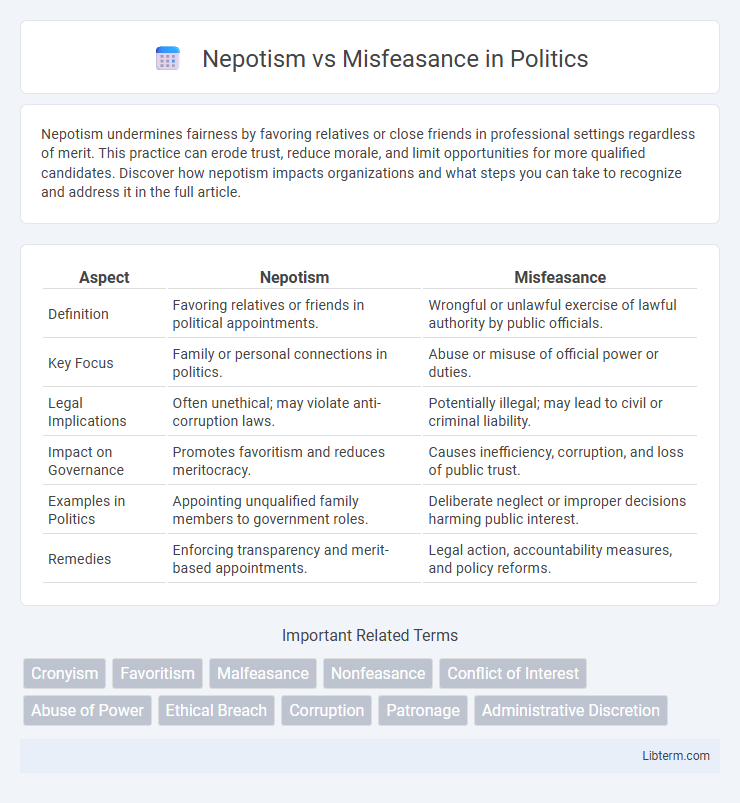Nepotism undermines fairness by favoring relatives or close friends in professional settings regardless of merit. This practice can erode trust, reduce morale, and limit opportunities for more qualified candidates. Discover how nepotism impacts organizations and what steps you can take to recognize and address it in the full article.
Table of Comparison
| Aspect | Nepotism | Misfeasance |
|---|---|---|
| Definition | Favoring relatives or friends in political appointments. | Wrongful or unlawful exercise of lawful authority by public officials. |
| Key Focus | Family or personal connections in politics. | Abuse or misuse of official power or duties. |
| Legal Implications | Often unethical; may violate anti-corruption laws. | Potentially illegal; may lead to civil or criminal liability. |
| Impact on Governance | Promotes favoritism and reduces meritocracy. | Causes inefficiency, corruption, and loss of public trust. |
| Examples in Politics | Appointing unqualified family members to government roles. | Deliberate neglect or improper decisions harming public interest. |
| Remedies | Enforcing transparency and merit-based appointments. | Legal action, accountability measures, and policy reforms. |
Understanding Nepotism: Definition and Context
Nepotism refers to the practice of favoring relatives or close friends, especially by giving them jobs or positions of power regardless of their qualifications. This unethical behavior often undermines meritocracy and can lead to decreased organizational efficiency and employee morale. Understanding nepotism is critical in legal and corporate governance contexts, where it can be distinguished from misfeasance, which involves the improper performance of lawful acts.
Defining Misfeasance: Legal and Ethical Perspectives
Misfeasance refers to the improper or wrongful performance of a lawful act, causing harm or damage, distinguishing it from nepotism, which involves favoritism based on family relationships. Legally, misfeasance encompasses breaches of duty by public officials or fiduciaries, where actions are carried out negligently or with intent to cause injury, leading to potential civil liability. Ethically, misfeasance violates professional standards of conduct by undermining trust and accountability, emphasizing the importance of transparency and integrity in roles involving public or organizational responsibilities.
Key Differences: Nepotism vs Misfeasance
Nepotism involves favoritism granted to relatives or close friends, particularly in employment or business decisions, often undermining meritocracy and fairness. Misfeasance refers to the improper or unlawful performance of a lawful act, typically causing harm or damage due to negligence or intentional misconduct by a public official or employee. The key difference lies in nepotism being a bias-driven ethical issue affecting hiring and promotion, whereas misfeasance is a legal violation related to the misuse of authority or duties.
Historical Examples of Nepotism in Organizations
Historical examples of nepotism in organizations include the Medici family's control over Florence during the Renaissance, where family members were appointed to key political and banking positions, strengthening their power through favoritism. In the Catholic Church, nepotism was prevalent in the appointment of popes' relatives as cardinals, exemplified by Pope Alexander VI's promotion of his son Cesare Borgia. These instances demonstrate how nepotism often led to the consolidation of power and resources within a family, contrasting with misfeasance, which involves the wrongful exercise of lawful authority.
Recognizing Misfeasance in Public and Private Sectors
Misfeasance in public and private sectors involves the improper performance of lawful acts, often resulting in harm or loss, distinguishing it from nepotism, which is favoritism based on family ties. Recognizing misfeasance requires identifying actions that breach fiduciary duties, neglect legal obligations, or involve reckless conduct undermining organizational integrity. Effective oversight mechanisms and transparent reporting systems are essential for detecting misfeasance and preventing corruption or malpractice within both governmental institutions and corporate environments.
Impact of Nepotism on Workplace Morale and Productivity
Nepotism undermines workplace morale by fostering perceptions of unfairness and favoritism, leading to decreased employee motivation and trust in leadership. Reduced morale often results in lower productivity, as talented employees may feel undervalued and disengage from their roles. Misfeasance, while damaging due to improper performance of duties, typically impacts organizational integrity rather than the personal dynamics that affect day-to-day workplace culture.
The Consequences of Misfeasance in Governance
Misfeasance in governance leads to severe legal and financial repercussions, including lawsuits, fines, and loss of public trust. It undermines organizational integrity, causing decreased employee morale and impaired decision-making processes. Persistent misfeasance can result in regulatory sanctions and long-term damage to the institution's reputation and effectiveness.
Legal Implications: How Nepotism and Misfeasance are Punished
Nepotism often leads to legal consequences such as fines, nullification of contracts, or dismissal from public office due to favoritism violating employment laws and public trust statutes. Misfeasance, involving the improper performance of lawful duties, can result in criminal charges, civil liability, or disciplinary action including fines, imprisonment, and restitution. Courts and regulatory bodies enforce sanctions to uphold accountability, deter unethical behavior, and protect organizational integrity.
Preventive Strategies Against Nepotism and Misfeasance
Implementing transparent recruitment processes and strict conflict-of-interest policies effectively curbs nepotism by ensuring merit-based hiring and promotions. Regular audits and thorough investigations serve as critical preventive strategies against misfeasance, promoting accountability and ethical conduct within organizations. Training programs on ethical behavior and whistleblower protection further reinforce a culture that discourages favoritism and abuses of power.
Building Ethical Cultures: Combating Nepotism and Misfeasance
Building ethical cultures requires clear policies and consistent enforcement to combat nepotism and misfeasance effectively. Organizations must implement transparent hiring and promotion processes alongside regular audits and whistleblower protections to deter favoritism and wrongful conduct. Embedding accountability and integrity within corporate governance promotes trust and sustains long-term organizational success.
Nepotism Infographic

 libterm.com
libterm.com